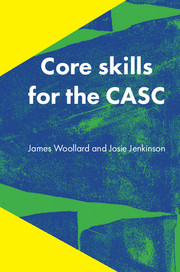Book contents
- Frontmatter
- Contents
- Abbreviations
- Preface
- Introduction
- Part 1 Core skills
- 1 Core communication skills
- 2 Verbal communication skills
- 3 Taking control
- 4 Structured presentations
- 5 Physical examination, investigations and cognitive assessment
- Part 2 Planning your preparation
- Part 3 Putting skills into practice – mock stations
- Resources
- Appendix
- Index
5 - Physical examination, investigations and cognitive assessment
from Part 1 - Core skills
Published online by Cambridge University Press: 01 January 2018
- Frontmatter
- Contents
- Abbreviations
- Preface
- Introduction
- Part 1 Core skills
- 1 Core communication skills
- 2 Verbal communication skills
- 3 Taking control
- 4 Structured presentations
- 5 Physical examination, investigations and cognitive assessment
- Part 2 Planning your preparation
- Part 3 Putting skills into practice – mock stations
- Resources
- Appendix
- Index
Summary
So far we have covered various aspects of verbal and non-verbal communication as well as structured approaches to stations. Three types of station included in the CASC that can cause a lot of anxiety for candidates are physical examination, interpretation of results and cognitive assessment. Unfortunately, these are often the stations left until last when it comes to revision – but to perform well they should be included right from the start.
Physical examination
Many of you may have done OSCEs (Observed Structured Clinical Examination) at medical school or as part of your postgraduate training. There is little difference between these and the physical examination stations you will encounter in the CASC. You need to be able to complete an appropriate physical examination in a sensitive, efficient and confident manner in a short amount of time. When preparing for these stations, a good way to start is by devising a protocol for each of the systems you might need to examine (e.g. respiratory, cardiovascular, endocrine), with diagrams if you find these helpful. Then practise the instructions you would need to give to a patient in order for them to understand clearly what you need them to do to follow this protocol. Often during their revision people practise the examination itself but not what they will actually say as they go through it, and then find it difficult to find the right words to communicate clearly in the actual exam – this looks clumsy and feels awkward.
Once you have your protocol and instructions clear, practise. Practise again! These examinations should become fluid and natural so that during the exam you can show both competence and confidence. You should try to present the findings of your examination as you go along in lay language so that the patient can understand them. This demonstrates several skills, but perhaps the most important is your ability to convey information using non-technical, jargon-free language and help a patient feel at ease.
Great opportunities to practise these stations are while admitting a patient to a ward when on-call. See whether you can do a specific examination in 5 min, presenting the findings to the patient as you go along. Ask your patients for feedback if you feel it appropriate.
- Type
- Chapter
- Information
- Core Skills for the CASC , pp. 30 - 34Publisher: Royal College of PsychiatristsPrint publication year: 2016



